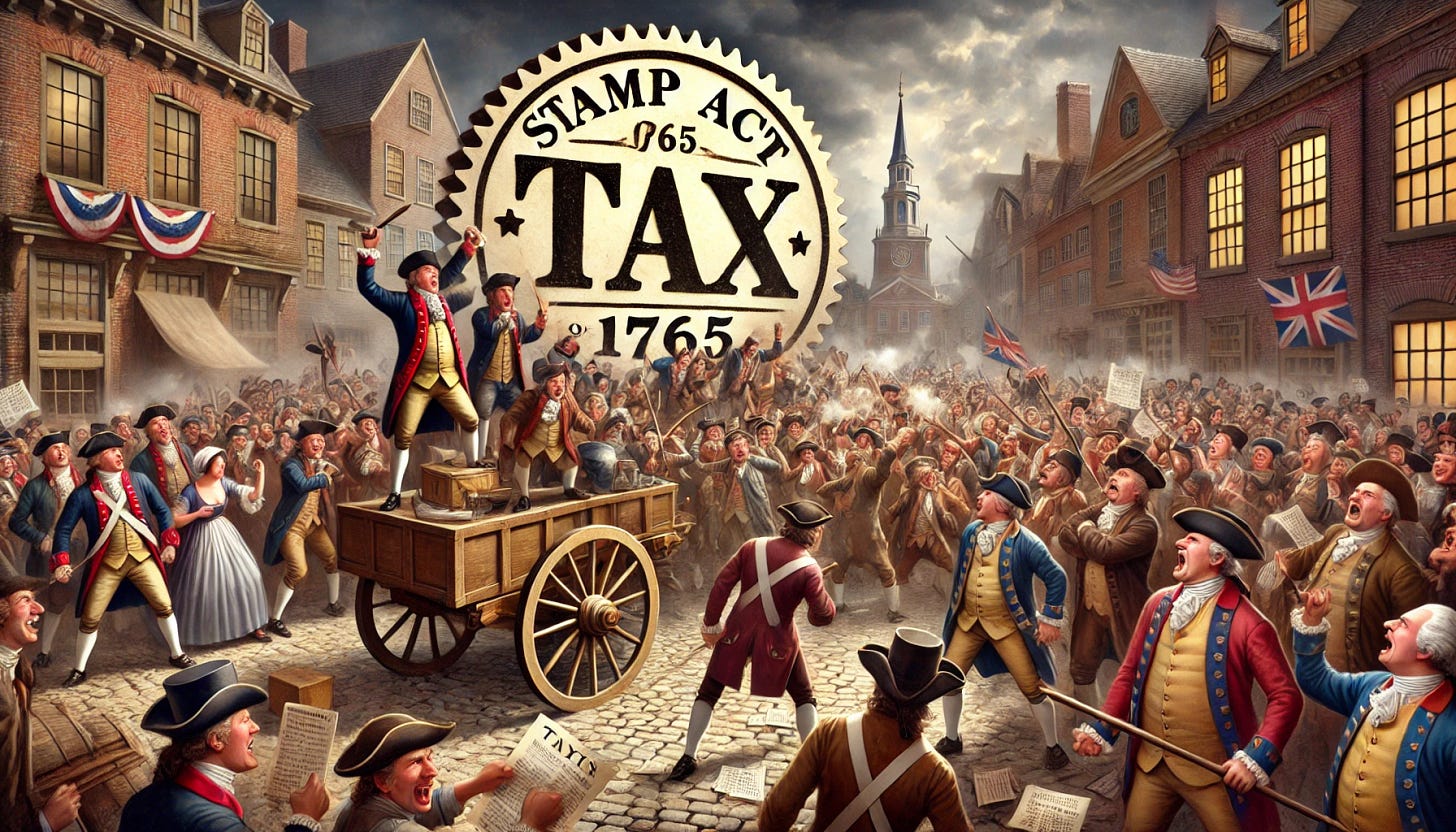The Stamp Act of 1765: The Spark That Lit the Colonial Fire
The Stamp Act of 1765 ignited colonial outrage, spurring a fight for liberty and sparking America's journey toward independence.
Sometimes, history offers us a perfect example of how to NOT manage a nation—and the 1765 Stamp Act was exactly that for Britain. Parliament in London decided it could slap a tax on almost every piece of printed material in the colonies—from newspapers and pamphlets to legal documents and even playing cards. This move, known as the Stamp Act, became one of the first real sparks of resistance that drove the American colonies to demand freedom from British rule. Let’s dig into why the Stamp Act hit such a nerve, how the colonies fought back, and why this event matters today.
The Stamp Act: Britain’s Parliamentary Overreach
The Stamp Act wasn’t just a tax; it was a flat-out power grab. Britain wanted the colonies to pay for their share of the recent French and Indian War, but rather than negotiating or explaining, Parliament went straight for colonial wallets without consent. Every piece of printed material now required an official stamp, which had to be bought with hard currency—scarce in the colonies at the time.
Colonial leaders weren’t just angry about the money. They saw this as a direct attack on their rights as Englishmen. "No taxation without representation!" became the rallying cry. Colonists believed that only their elected assemblies, not a distant Parliament, had the right to impose taxes on them. They weren’t wrong. According to English law, British citizens couldn’t be taxed without elected representatives speaking on their behalf. The Stamp Act boldly ignored that principle, and the colonies weren’t about to take it lying down.
The Sons of Liberty and the Rise of Resistance
When news of the Stamp Act spread, it didn’t take long for colonial protests to turn fierce. In Massachusetts, a young Samuel Adams formed a group that would later become legendary: the Sons of Liberty. These men weren’t just talking—they were taking action. They held rallies, printed pamphlets, and organized boycotts of British goods. They even went as far as intimidating tax collectors, some of whom were forced to resign.
The Sons of Liberty didn’t stop at protests; they used their organizing power to pull in colonists from all walks of life. Printers, farmers, dockworkers—all were encouraged to take a stand. By uniting people across social and economic classes, the Sons of Liberty spread the message that Parliament’s overreach was everyone’s problem. This unity in the face of British oppression became one of the greatest strengths of the American colonies as they marched toward independence.
Colonial Congress: The Stamp Act Congress Flexes Its Muscles
In October 1765, just before the Stamp Act went into effect, representatives from nine colonies met in New York for what would be called the Stamp Act Congress. This was an unprecedented gathering of colonial leaders, and their goal was clear: to formally oppose Britain’s latest move. They drafted a document, the *Declaration of Rights and Grievances*, that detailed their objections to the Stamp Act and laid out a legal argument against “taxation without representation.”
The Stamp Act Congress also urged colonists to resist buying British goods—a call to boycott that was more than symbolic. These economic boycotts hit Britain where it hurt: in the pocketbook. London merchants, realizing their profits were tanking, pressured Parliament to repeal the tax. The colonies had shown, for the first time, that they could come together in opposition, foreshadowing a much larger alliance that would lead to the Revolution.
Repeal and Legacy: Lessons in Unity and Liberty
The pressure worked. Parliament repealed the Stamp Act on March 18, 1766, just five months after it went into effect. But the story didn’t end there. While the Stamp Act was gone, Britain wasn’t about to admit defeat. Parliament followed the repeal with the Declaratory Act, claiming it still had the power to pass laws for the colonies "in all cases whatsoever." The message was clear: the fight over colonial rights was just beginning.
The Stamp Act left a legacy that went beyond its repeal. It showed colonists that united, they could make a real impact. It also forced them to consider a future where they might have to defend their rights against a British government that seemed more interested in control than partnership. The debates over the Stamp Act created a generation of Americans who believed deeply in self-governance and liberty, setting the stage for the full-blown push for independence that was only a decade away.
Why the Stamp Act Still Matters Today
The story of the Stamp Act is more than just history—it’s a reminder of what happens when government forgets its duty to respect individual rights. The colonists stood up against what they saw as blatant tyranny, reminding us that governments serve their people, not the other way around. If our elected officials start overstepping, remember that the American spirit is rooted in accountability.
Want to keep that legacy alive? The Stamp Act’s story reminds us of the power of ordinary citizens standing together. It’s a tradition that’s as relevant today as it was back in 1765.
Just Sayin…

